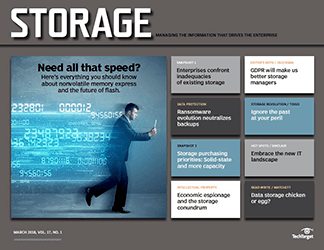PRO+ Premium Content/Storage
Access your Pro+ Content below.
Ten ways to protect intellectual property and trade secrets

This article is part of the Storage issue of March 2018, Vol. 17, No. 1
Economic espionage -- sometimes called industrial espionage -- is the theft of a company's intellectual property, know-how or trade secrets. The loss of industrial information and IP through cyberespionage constitutes the "greatest unwilling transfer of wealth in history," Gen. Keith Alexander, formerly commander of the military's Cyber Command, told the Senate Armed Services Committee in 2013. The global information footprint is growing at a speed never seen before, making it increasingly hard to protect intellectual property. There are thousands of exabytes of new data created every year and information volumes are growing exponentially. Compounding matters, some organizations fallaciously believe that because storage is relatively cheap, they can -- and even should -- keep everything forever. Sound familiar? How big is the problem? In recent years, the misappropriation of U.S. companies' trade secrets has also grown uncontrollably. According to the Department of Commerce in an update to its 2012 report "Intellectual Property ...
Features in this issue
-
NVMe SSDs: Is there a need for all this speed?
Everything you should know to decide if nonvolatile memory express is right for your enterprise and, if it is, how to plan for the future of flash storage.
-
Primary storage optimization overcomes a range of challenges
Enterprises turn to different products, technologies and tools to optimize primary storage, overcome data storage challenges and make networked storage deployments more efficient.
-
Ten ways to protect intellectual property and trade secrets
Industrial espionage is on the rise, and more data means more risk. Find out how to control the growth of data stores and secure your organization's most valuable assets.
Columns in this issue
-
The EU's GDPR will make us better storage managers
The European Union's General Data Protection Regulation has organizations worldwide rethinking storage management to their and their customers' benefit.
-
The danger of ageism in the tech industry and ignoring the past
Monolithic storage rules the day in spite of the advent of software-defined storage, because vendors and enterprises ignore data storage history and discount experience.
-
Is demand for data storage or supply driving increased storage?
Figuring out whether we're storing more data than ever because we're producing more data or because constantly evolving storage technology lets us store more of it isn't easy.
